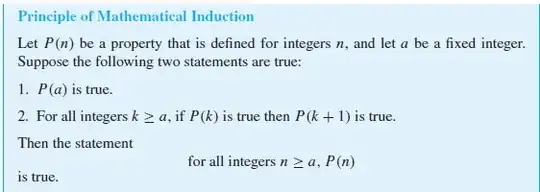Prove the following statement by mathematical induction:
$n(n^2+5)$ is divisible by 6 for all integer $n \ge 1$
My attempt:
Let the given statement be p(n).
(1) $1(1^2+5)$=6 Hence, p(1) is true.
(2) Suppose for all integer $k \ge 1$, p(k) is true.
That is, $k(k^2+5)$ is divisible by 6
We must show that p(k+1) is true.
$(k+1)((k+1)^2+5)$=$k^3+3k^2+3k+1+5(k+1)$
=$k^3+3k^2+8k+6$
=$k(k^2+5)+3k^2+3k+6$
I'm stuck on this step. I feel I have to show $3k^2+3k+6$ is divisible by 6. But, how can I show $3k^2+3k+6$ is divisible by 6?
